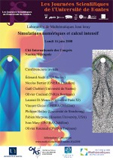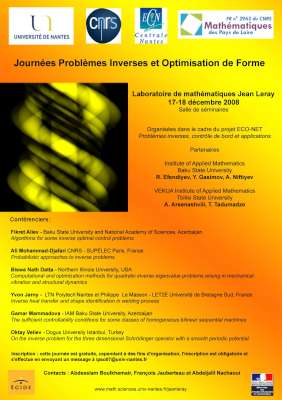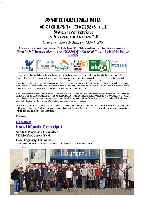
 Les journées scientifiques de l’Université de Nantes organisées par Jacques GIRARDEAU, Vice-Président du Conseil Scientifique de l’Université de Nantes le lundi 16 juin à la Cité internationale des congrès - Nantes-Métropole, réunira 22 porteurs de projets dans les domaines des Sciences et Techniques, Biologie-Santé, et Sciences Humaines et Sociales. Dans le domaine des sciences et techniques, le laboratoire de mathématiques Jean Leray présentera le colloque intitulé "Simulations numériques et calcul intensif"
Les journées scientifiques de l’Université de Nantes organisées par Jacques GIRARDEAU, Vice-Président du Conseil Scientifique de l’Université de Nantes le lundi 16 juin à la Cité internationale des congrès - Nantes-Métropole, réunira 22 porteurs de projets dans les domaines des Sciences et Techniques, Biologie-Santé, et Sciences Humaines et Sociales. Dans le domaine des sciences et techniques, le laboratoire de mathématiques Jean Leray présentera le colloque intitulé "Simulations numériques et calcul intensif"
Cette manifestation rassemble 21 colloques scientifiques pluridisciplinaires, des stands, des posters, ainsi que 2 conférences grand public gratuites et ouvertes à tous. Pour la première fois à Nantes, près de 1500 chercheurs nantais et étrangers se réunissent. Cet événement met en lumière la richesse de la recherche développée à l'Université de Nantes.
Vous y êtes chaleureusement invités.
Au programme :
Vous êtes invités à visiter les stands de nos laboratoires et d'autres projets scientifiques. C'est une occasion unique pour échanger avec nos chercheurs.
Cet événement se déroulera à la Cité des Congrès et a pour objectif de valoriser la recherche de qualité et variée développée par l’Université de Nantes.
 Dans le cadre du projet ECONET avec l'Azerbaïdjan et la Géorgie, une semaine de travail sera organisée sur le thème «problèmes inverses et optimisation de forme» du 13 au 20 décembre 2008. Un moment fort de cette semaine est une conférence sur le même thème : les 17-18 Décembre 2008 : Journées Problèmes Inverses et Optimisation de Forme au Laboratoire de Mathématiques Jean Leray à l'Université de Nantes. dont l'objectif est de permettre au groupe de travail de discuter avec d'autres spécialistes dans le développement des aspects théoriques numériques de ce type de problèmes.Cette conférence est ouverte aux chercheurs et étudiants qui souhaitent y participer.
Dans le cadre du projet ECONET avec l'Azerbaïdjan et la Géorgie, une semaine de travail sera organisée sur le thème «problèmes inverses et optimisation de forme» du 13 au 20 décembre 2008. Un moment fort de cette semaine est une conférence sur le même thème : les 17-18 Décembre 2008 : Journées Problèmes Inverses et Optimisation de Forme au Laboratoire de Mathématiques Jean Leray à l'Université de Nantes. dont l'objectif est de permettre au groupe de travail de discuter avec d'autres spécialistes dans le développement des aspects théoriques numériques de ce type de problèmes.Cette conférence est ouverte aux chercheurs et étudiants qui souhaitent y participer.
Pour visualiser le programme: Programmeipso08.pdf (274.71 Ko)
Pour visualiser l'affiche : AfficheIPSO_2008.pdf (1.37 Mo)
Liste des Conférenciers :
"Algorithms for some inverse optimal control problems".
"Estimation bayésienne pour le problème inverse en imagerie microonde".
"Probabilistic approaches to inverse problems".
"Computational and optimization methods for quadratic inverse eigenvalue problems arising in mechanical vibration and structural dynamics".
"The one-dimensional Inverse wave spectral problem with discontinuous wave speed".
"New approach to the solution of some shape optimization and domain evolution problems".
"Inverse heat transfer and shape identification in welding process".
"The sufficient controllability conditions for some classes of homogeneous bilinear sequential machines".
"Liens entre le problème de la tomographie X et la détermination d'une densité jointe à partir de ses marginales".
"Optimal control and inverse problems for some classes of neutral differential equations".
"On the Inverse Problem for the Three Dimensional Schrödinger Operator with a Smooth Periodic Potential".
 Lien du site web http://www.math.sciences.univ-nantes.fr/MMCE09/?q=node/2)
Lien du site web http://www.math.sciences.univ-nantes.fr/MMCE09/?q=node/2)
The conference will take place: June 8th-9th in Nantes.
The goal of this meeting is to gather mathematicians working in the field of modelisation, analysis, approximation, numerical analysis and scientific computing applied to electrocardiology.
Organisation :
During 2 days, a dozen of international researchers will present their work. 20 min talks reserved for Ph-D students will also be scheduled. A financial support may be granted for participating students.
Even though this conference is mainly run by mathematicians, there is a strong will of opening towards the concerned fields of biology and medical imaging, especially towards researchers and students who work on the interface between these fields and wish to strengthen their knowledge.
The first day (june 8th) is part of "Les journées scientifiques de l'université de Nantes", an annual event regrouping conferences and other scientific activities around research fields of interest in the university of Nantes.
Scientific comitee
* Y. Bourgault, Université d'Ottawa
* Y. Coudière, Université de Nantes
* M. Thiriet, Université Paris 6 et Inria
* M. Saad, Ecole Centrale de Nantes
* R. Turpault, Université de Nantes
Organisation
Y. Coudière, F. Jauberteau and R. Turpault - Université de Nantes
 The Workshop will take place on June 7 to 11, 2010, in Saint Jean de Monts (Vendée, France) - see http://uk.saint-jean-de-monts.com/
The Workshop will take place on June 7 to 11, 2010, in Saint Jean de Monts (Vendée, France) - see http://uk.saint-jean-de-monts.com/
This year's topic will be
DEFORMATION, QUANTIZATION, AND ALGEBRAIC INDEX THEOREMS
WAGP2010 is the 15th event of a series of Schools and Workshops that have been organized by the Mathematical Physics and Geometry group of the International School for Advanced Studies in Trieste in conjunction with leading institutions around the world. Past events have taken place in Trieste, Salamanca and Medina del Campo (Spain), Luminy (France), Como (Italy), Philadelphia (USA), Vienna (Austria), Tianjin (China), Seoul (Korea), Hangzhou (China), Maresias (Brazil). You may have a look at the past events at the following link:
http://www.sissa.it/~bruzzo/swagps/swagps.html
Deformation quantization, i.e., the study of the deformation of classical structures, such as Poisson manifolds, to noncommutative spaces, has been, together with its many applications, one of the central characters in the deep and fruitful interplay between geometry and physics that has taken place in the last 20 years. With its connections with, and applications to, noncommutative geometry, integrable systems, quantum field theory and strings, it represents a crossing point of many fundamental areas of research in present-day mathematics and theoretical physics. In the tradition of this series of events, this year's workshop aims at discussing the state of the art in this field, with a special emphasis on the mutual interactions between the physics and the mathematics communities.
Speakers: A. Alekseev, H. Bursztyn, D. Calaque, A. Caldararu, A. D'Agnolo, G. Dito, B. Enriquez, B. Fedosov, F. Ferrari, G. Halbout, G. Landi, P. Piazza, P. Schapira, B. Tsygan*, P. van Moerbeke
The programme will include three minicourses (two of them given by D. Calaque and A. D'Agnolo), and some contributed talks proposed by the participants. Those who want to submit a communication should send a title and a short abstract together with their registration form. Inclusion into the programme will be decided by the scientific committee.
Depending upon the outcome of our applications to funding institutions, some support may be available to PhD students and post- doctoral fellows. If you think you need support please indicate this in your application for registration.
If you are interested in participating, please write to igorre@sissa.it by January 31st, 2010.
Registered participants will receive further announcements, information about lodging and other details.
On behalf of the organizing committee, we hope you will be interested in this Workshop, and look forward to seeing you in Saint Jean des Monts.
Ugo Bruzzo Igor Mencattini Vladimir Rubtsov
Workshop web page: http://people.sissa.it/~bruzzo/wagp2010/index.htm
 À l'occasion de la venue de Sergueï Novikov, un atelier de Topologie aura lieu le dimanche 6 juillet 2008 pm et le lundi 7 juillet tout la journée au laboratoire de Mathématiques Jean Leray à l'Université des sciences de Nantes.
À l'occasion de la venue de Sergueï Novikov, un atelier de Topologie aura lieu le dimanche 6 juillet 2008 pm et le lundi 7 juillet tout la journée au laboratoire de Mathématiques Jean Leray à l'Université des sciences de Nantes.
La conférence de Novikov sera dans le cadre d'un colloquium le lundi 7 juillet 2008 à 15h, salle de séminaire.
Discrete $GL_n$ Connections and New Discretization of Complex Analysis
 Le Laboratoire Angevin de REcherche en MAthématiques, à Angers, organise du 9 juin 2008 au 13 juin 2008, un workshop : "The First Angers workshop in real algebraic geometry"
Le Laboratoire Angevin de REcherche en MAthématiques, à Angers, organise du 9 juin 2008 au 13 juin 2008, un workshop : "The First Angers workshop in real algebraic geometry"
Principaux thèmes :
Le workshop est organisé par Jean-Philippe Monnier et Adam Parusiński.
Liste des Participants:
 Matpyl Spring activity on vector bundles overs curves
Matpyl Spring activity on vector bundles overs curves
We will start on Monday at 9h. Registration 8h30!
This page is an overview of the topics that will be treated by the activity. Names behind the lectures indicate the distribution of the talks to be given by the participants.
There will be 6 lectures of 45 minutes a day, scheduled as follows
09h00 - 09h45 Lecture 1
09h45 - 10h15 Coffee break
10h15 - 11h00 Lecture 2
11h15 - 12h00 Lecture 3
12h00 - 14h00 Lunch
14h00 - 14h45 Lecture 4
15h00 - 15h45 Lecture 5
15h45 - 16h15 Coffee break
16h15 - 17h00 Lecture 6
Monday
AM : Salle Hypathia
Lecture 1 [Chloé Grégoire]
References [HL],[Se],[LeP]
Lecture 2 [Arvid Perego]
References [Se]
Lecture 3 [Heinrich Hartmann]
References: [LeP] and [HL]
PM : Salle Au Val
Lecture 4 [Yashonidhi Pandey]
References: for general facts on the algebraic fundamental group see e.g. chapter 9 by A. Mézard in [BLR], on the relative/absolute Frobenius see e.g [Ray] section 4.
Lecture 5/6 [Christian Lehn & Markus Zowislok]
Reference: [K] section 5, [Ray] section 4, [LP], [RR]
Tuesday : Principal $G$-bundles
AM : Salle Eole
Lecture 1 [Manfred Lehn]
Reference: [Spr]
Lecture 2 [Tanja Becker]
References: [So], [Ra]
Lecture 3 [Heinrich Hartmann]
References: [Ra], [So1], [N]
PM : Salle Au Val
Lecture 4 [Olivier Serman]
Reference: [Beh] (8.2.6), [HN]
Lecture 5 [Jochen Heinloth]
Existence and uniqueness of canonical reduction of $E_G$ (with sketch of proof...)
References: mainly [B]; see also [BH], [AB]
Lecture 6 [Jochen Heinloth]
References: [B], [IMP], [He2]
Wednesday: moduli spaces
AM : Salle Hypathia
Lecture 1 [Alessandra Sarti]
References: [HL] Section 2.2, section 4; [Do], [LeP]
Lecture 2 [Alessandra Sarti]
References: [LeP]
Lecture 3 [Samuel Boissière]
References: [LeP]
PM Salle Hypathia
Lecture 4 [Samuel Boissière]
References: [BLS]
Lecture 5 [Olivier Serman]
References: [Lan], [HL] section 2B for the vector bundle case; [BP], [F], [He1] for $G$-bundles
Lecture 6 [Etienne Mann]
[FMW], [Las]
Thursday: Conformal blocks and Verlinde formula
AM : Salle des séminaires
Lecture 1 [Timo Schürg]
[Go], [So1]
Lectures 2/3 [Manfred Lehn]
References: [So1], [BL], [LS2], [F2]
PM : Salle Hypathia
Lecture 4 [Manfred Lehn]
[So2], [SU]
Lecture 5 [Christoph Sorger]
References: [So1],[So3],[BL], [LS2], [F2]
Lecture 6 [Christian Lehn]
[BL], [LS2]
Friday: projective connections, WZW and Hitchin
AM : Salle Hypathia
Lectures 1/2/3 [Christian Pauly]
PM : Salle Au Val
Lectures 4/5/6 [Christoph Sorger]
[Be], [So2]
Saturday: Level-Rank duality
AM : Salle Hypathia
Lecture 1/2 [Rémy Oudompheng]
Lecture 3 [everybody]
References :
Organisers: Manfred Lehn, Christian Pauly, Christoph Sorger
 Université du Maine, Le Mans, 16-19 March, 2009 The purpose of this workshop is to stimulate research in statistical inference for continuous time stochastic processes. This branch of mathematical statistics attracts more and more attention of the statisticians and probabilists because first: the real systems are often well described by the continuous time mathematical models (point processes, diffusion processes, stochastic differential equations with partial derivatives, stable processes etc.) and the second: the diversity of the models and the diversity of the statements of the statistical problems make these models quite attractive for the mathematicians because all these allow to obtain many new results which sometimes have no analogue in discrete time models.
Université du Maine, Le Mans, 16-19 March, 2009 The purpose of this workshop is to stimulate research in statistical inference for continuous time stochastic processes. This branch of mathematical statistics attracts more and more attention of the statisticians and probabilists because first: the real systems are often well described by the continuous time mathematical models (point processes, diffusion processes, stochastic differential equations with partial derivatives, stable processes etc.) and the second: the diversity of the models and the diversity of the statements of the statistical problems make these models quite attractive for the mathematicians because all these allow to obtain many new results which sometimes have no analogue in discrete time models.
 Angers 16 — 19 June 2010
Angers 16 — 19 June 2010
The principal aim of the DYNSTOCH network is to make a major contribution to the theory of statistical inference for stochastic processes by taking advantage of the tools of modern probability theory including stochastic calculus and by using highly computer-intensive methods.
The principal objectives of the DYNSTOCH network are : (1) Development of statistical methods for continuous-time stochastic processes and the study of the properties of the resulting procedures ; (2) Development of asymptotic statistical theory for stochastic processes ; (3) Modelling and statistical data analysis in finance, turbulence, hydrology, and telecommunication. For more information click here.
The DYNSTOCH had -up to 2004- the nine teams that are listed below, the names in the parentheses was the scientists in charge of the teams.
1.Copenhagen Team (Michael Sørensen)
In the informal follow up, there has been involvement of Ghent (Michèle Vanmaele), Budapest (Laszlo Gerenscer), Wroclaw (Tomas Rolski), Heidelberg (Markus Reiss ), Linköping (Timo Koski), Tokyo ( Nakahiro Yoshida), Le Mans (Youri Kutoyans), Angers (Lioudmila Vostrikova).
The Dynstoch conferences take place each year, namely in the paste in Berlin(Germany)2009, in Padoue (Italie) in 2008, in Amsterdam ( Pays-Bas) in 2007, in Mainz (Allemagne) in 2006.
For more information click here.http://dynstoch.math.univ-angers.fr/